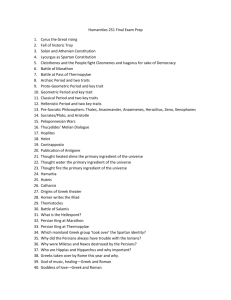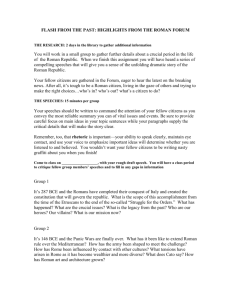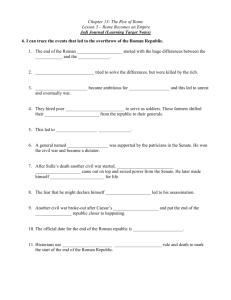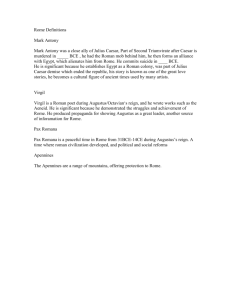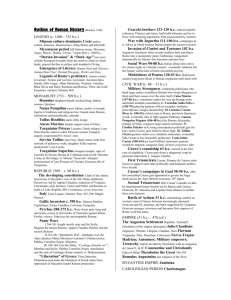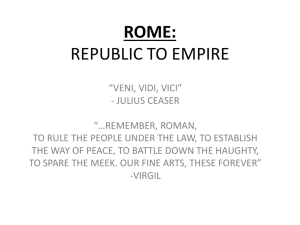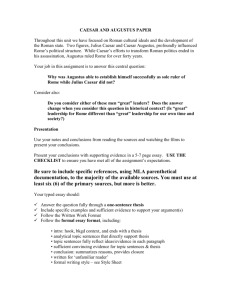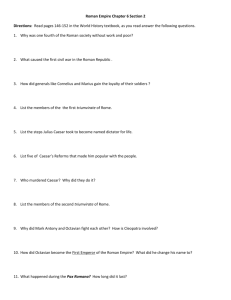Humanities 251 Exam Prep Fall 2013 Part I: provide the missing
advertisement
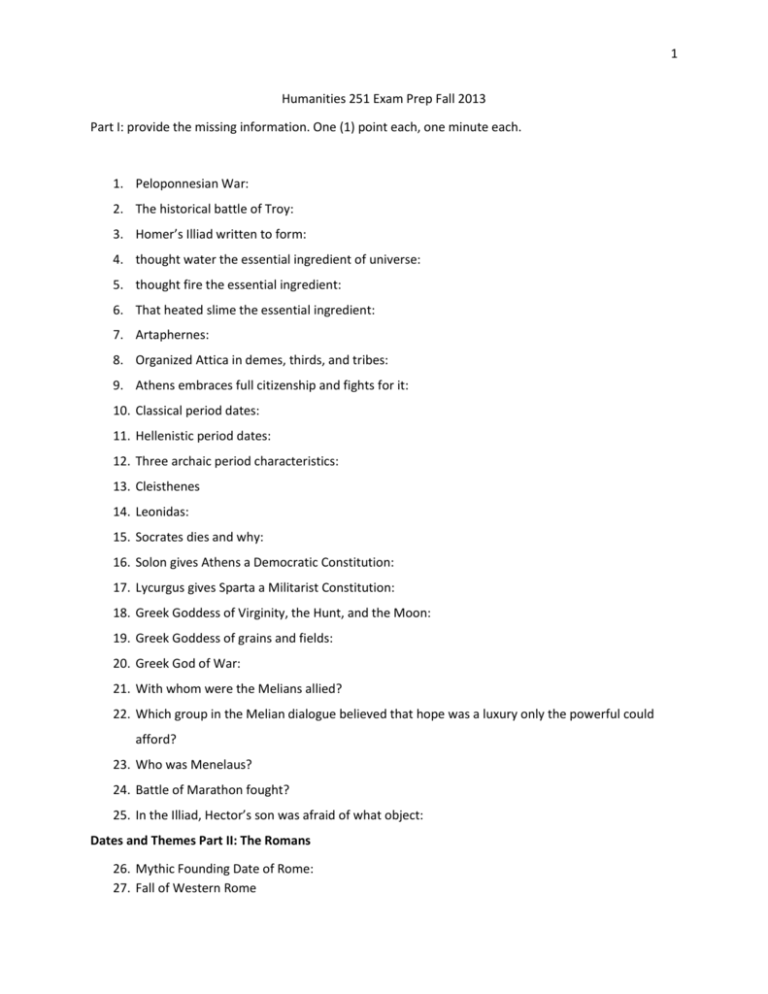
1 Humanities 251 Exam Prep Fall 2013 Part I: provide the missing information. One (1) point each, one minute each. 1. Peloponnesian War: 2. The historical battle of Troy: 3. Homer’s Illiad written to form: 4. thought water the essential ingredient of universe: 5. thought fire the essential ingredient: 6. That heated slime the essential ingredient: 7. Artaphernes: 8. Organized Attica in demes, thirds, and tribes: 9. Athens embraces full citizenship and fights for it: 10. Classical period dates: 11. Hellenistic period dates: 12. Three archaic period characteristics: 13. Cleisthenes 14. Leonidas: 15. Socrates dies and why: 16. Solon gives Athens a Democratic Constitution: 17. Lycurgus gives Sparta a Militarist Constitution: 18. Greek Goddess of Virginity, the Hunt, and the Moon: 19. Greek Goddess of grains and fields: 20. Greek God of War: 21. With whom were the Melians allied? 22. Which group in the Melian dialogue believed that hope was a luxury only the powerful could afford? 23. Who was Menelaus? 24. Battle of Marathon fought? 25. In the Illiad, Hector’s son was afraid of what object: Dates and Themes Part II: The Romans 26. Mythic Founding Date of Rome: 27. Fall of Western Rome 2 28. 29. 30. 31. 32. 33. 34. 35. 36. 37. 38. 39. 40. 41. 42. 43. 44. 45. 46. 47. 48. 49. 50. 51. 52. 53. 54. 55. 56. 57. 58. 59. 60. 61. 62. 63. 64. 65. 66. 67. 68. 69. Fall of Eastern Rome (Constantinople) Promulgation of the 12 Tables Punic Wars: 264-201 Destruction of Carthage, Africa and Greece become Roman Provinces: 146 BCE First Triumvirate: 60 BCE: Pompey, Caesar, Crassus Caesar’s Conquest of Gaul: 58-49 BCE Battle of Pharsalus: Caesar defeats Pompey the Great in Greece, meets Cleopatra. Caesar Sole Dictator of Rome: 46-44 BCE (assassinated March 15th-the Ides of March) Second Triumvirate: 43 BCE Antony, Lepidus, Octavian Battle of Actium, won by Octavian against Antony and Cleopatra Octavian Augustus Caesar rules, the Pax Romana: 27 BCE-14 CE Rome adopts Christianity Propertius Elegies: (50-15 BCE, Elegies 29 BCE) Tacitus Germania: Germania published 98 BCE Suppression of Paganism, Christianity made state Religion: 392 CE Vandals, Goths, Visigoths, Germanic Hordes invade 409-455 CE Last Legionaire leaves the British isles 410 CE Charlemagne crowned Holy Roman Emperor and its significance Rome adopted Christianity this date and two reasons why Western Rome falls this date Name of Medea’s husband Attila the Hun sweeps into Northern Europe and its effect Clovis, King of the Franks, baptized Ceasar defeats Pompey at the Battle of Pharsalus Octavian Augustus Caesar’s reign, referred to as the Pax Romana Two contributions to the West made by Roman culture Caesar defeats the Gauls Name of Caesar’s German opponent in Gaul Battle of Actium. Eastern Rome falls this date, and to whom? Caesar killed in the forum Century in which Christianity and the West awoke Gregory the Great sends Christian missionaries into Western Europe from Rome this century What is a comitatus? How does it work? What is mead? Hellenistic period Thought heated slime the primary substance Parable of the Sparrow 800 CE, Christmas Day Three adversaries of Beowulf Sister Wife of Head of the Gods in Roman and Greek Intellectual Goddess, Roman and Greek 3 70. 71. 72. 73. 74. 75. 76. 77. 78. 79. 80. 81. 82. 83. 84. 85. 86. 87. 88. 89. 90. 91. 92. 93. 94. Goddess of Love, Roman and Greek Head of the Gods, Roman and Greek German weakness, according to Tacitus Achilles and the Tortoise Xenophanes’ rhetorical question Wiglaf Why the Dragon awakened in Beowulf Unferth Breca Heorot Illiad written: Twelve tables the rule of law. Punic Wars. Hubris Catharsis Hamartia Characteristics of archaic Greek statuary. Grendel the spawn of whom? contrapposto. King of the Geats. King of the Danes. Beowulf’s Lord or King. Year 1000 importance 490 BCE Darius and Persia defeated at Marathon. Democracy saved. 480. Xerxes leads second invasion; Thermopylae, sack of Athens, but complete loss in Naval Battle of Salamis. War ends 479 BCE. Plataea 95. 431---404 BCE. Peloponnesian War ends with fall of Athens. 96. 146 BCE. Romans sack Corinth, Greece becomes Roman province. 97. Helot 98. Hoplites 99. Latifundia 100. Mythical founding date of Rome 4 Part II. Geography of the Ancient world: Identify places or bodies of water by name. 1 2. 3. 4. 5. 6. 7. 8. 9. 10. 11. 12. 5 1. 5 2. 6 3. 6 Image Identification: Identify Period, dates for Period, and three distinct traits that confirm your identification: 7 8 9 10 11 Part IV Essay Questions 1. The Illiad, Medea, Caesar’s Gallic Wars, and Tacitus’ Germania tell the story of men at war, or of cultures dominated by warring men. But there are also several women in the books. Based on those whom we have met, what are the varied roles of women within the community of these ancient Greeks, Romans, and Germans? How did those roles change over time and space, and how do they differ from one another, and from the roles of women in contemporary American society? What do you make of what has remained the same, and of what has so changed? What are your predictions for the future role of women in American society, given its Greco-RomanGermanic past? 2. The Germanic peoples lived by a strict set of laws or cultural codes. In the literature, we see the heroes judged in relation to what has come to be referred to as the Heroic Code for behavior. Identify at least three aspects of this Heroic Code as you find evidence for them in Gallic Wars, Germania, and Beowulf. Further, compare and contrast these character traits to generic traits for both the Roman understanding of the heroic code, and our own understanding of Heroic behavior for men and women today, living in the 21st century, in Minot, as you see them. Speculate about the significance of what has changed, and what has remained the same. What is more, as a culture that is always in the process of rewriting codes, where are we headed in our future understanding of the heroic code? Be thoughtful, specific, and organized in your response.
